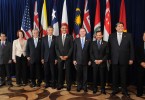The Productivity Commission has delivered a draft report calling for “enterprise contracts” and cuts to Sunday penalty rates, which experts fear would lead to a return to the controversial Howard-era Work Choices agreements.
Director of the Workplace Research Centre at the University of Sydney, John Buchanan, said the Workplace Relations Framework report could have been far worse, but had serious, negative long-term impacts if proposed changes were accepted.
“On the face of it, it’s a fairly constructive report. It rejects the fairly simple minded attacks on the Australian [industrial relations] system,” Buchanan said.
“Hidden within it, I think, are some pretty severe barbs that, if they were implemented, would radically change the nature of our labour standards regime.”
Under the proposal, a short list of potential members of the Fair Work Commission (FWC) would be drafted by the states and territories before being appointed by the federal employment minister alone.
Those appointed would be on a five-year contract, rather than the current tenure-based system.
“I just think that’s a joke, that would mean that basically the federal government could put on whoever it likes,” Buchanan said.
“If you want to have balance, [the states and territories] should have veto power.”
The draft report also recommended terminating strike actions by unions which caused “economic harm” to the employer, increasing the maximum penalty amount for unlawful industrial action, and aligning Sunday penalty rates with Saturday penalty rates.
It also proposed moving from a system of enterprise agreements to “enterprise contracts” for certain types of workers.
Instead of individually organised contractual agreements, employers would set blanket, enterprise contracts for all workers as a condition of employment.
This “take-it-or-leave-it” contract, Buchanan said, is basically a return of the Australian Workplace Agreements proposed under the failed Howard-era WorkChoices program.
Employees would not be allowed to vote, nor would unions be required to sit-in on the enterprise contract’s development. Individuals would still be able arrange particulars in their contract if employers agreed.
Prime Minister Tony Abbott and Employment Minister Eric Abetz backed down from the “draft nature” of the report on Tuesday, but Buchanan said it was likely they’d leave the matter of penalty rates to the FWC while pursuing the ability to hand pick the make up of the organisation.
“That’ll be seen as a compromise, when in fact the penalty rates is a bit of a side show,” Buchanan said.
“This is updating [the FWC] in a way which would make it a far less effective and independent force in the labour market, and would make it subject to the government of the day.”
Image credit: Fluor / Wikipedia Commons







